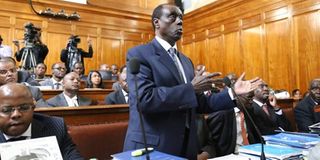Media houses defend digital TV licence order

Lawyer Paul Muite for Nation Media Group (NMG), Standard Media Group (SMG) and Royal Media Services (RMS) during digital migration hearings at the Supreme Court in Nairobi on July 30, 2014. PHOTO | BILLY MUTAI
What you need to know:
- Lawyer Paul Muite, for the media houses, Thursday told the Supreme Court that the government was solely to blame for the delay in enacting new laws creating an independent authority.
- The senior counsel further dismissed allegations that allowing the media houses to have digital frequencies would interfere with other frequencies issued by Communications Authority of Kenya.
Three leading media houses have defended a Court of Appeal order to issue them with a digital television broadcast licence.
Nation Media Group, Royal Media Services and The Standard Group argued that the appellate court was justified in finding that the Communications Authority of Kenya (CAK), previously called the Communications Commission of Kenya (CCK), was not the independent body envisioned in the Constitution to issue the licences.
Lawyer Paul Muite, for the media houses, Thursday told the Supreme Court that the government was solely to blame for the delay in enacting new laws creating an independent authority.
“The media started raising issues as to the independence of CCK as early as August 2011. It cannot be said that we woke up one day and came to court challenging its legality when evidence shows that even the Attorney-General gave his advice on the urgency of the matter,” said Mr Muite.
He said the three media houses had a right to protection by the law and that it was government’s failure to adhere to international policies on digital migration that justified the order by the Court of Appeal that they be issued with a licence.
LEVEL PLAYING FIELD
The lawyer dismissed claims by the communications authority that all media houses would be on a level playing field once they were on the same digital platform.
He said this amounted to bringing down someone from the top of the roof to be at the same level with someone on the ground.
“It is like the case of four people living in an upmarket estate. Since one of them has a van, you tell the rest to abandon their cars and use the van so that they can be on the same level, instead of helping the other to also rise,” said Mr Muite.
The senior counsel further dismissed allegations that allowing the media houses to have digital frequencies would interfere with other frequencies issued by Communications Authority of Kenya.
He said their contention was about broadcast and not those frequencies issued to the police, military and mobile telecommunication firms.
State counsel Mwangi Njoroge, however, sought to have the Court of Appeal judgment set aside, arguing that the judges gave orders which were not asked for by the parties.
“The judges were wrong in giving the licences as a right when they were not asked. The media’s only claim was a promise by the government to consider them when issuing the frequencies,” said Mr Njoroge.
According to Mr Njoroge, allowing the three media houses to own a digital licence on grounds of a legitimate expectation had opened the door for any other media house to make the same claims.
The hearing continues.





